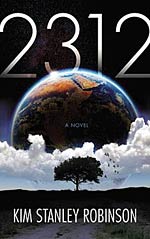
![]() Utopian
Utopian
7/21/2021
![]()
Kim Stanley Robinson's 2312 was published in 2012 and attempts to postulate a possible history 30 years hence.
This is very much a Kim Stanley Robinson novel. If you've not liked his works previously this isn't going to change your mind and if you are new to his work I wouldn't start here (probably go for Red Mars or possibly Antarctica).
However, if you like Robinson's style this is something of a tour de force of imagination, featuring a plethora of weird and wonderful space habitats, fluid genders and AI. In a strange way many of the elements reminded me of Iain M. Banks' Culture novels, although Robinson uses these elements to very different effect.
Robinson revisits a number of elements from elsewhere in his oeuvre, including the colonisation of the solar system; Terminator, a city on Mercury which moves on tracks to stay ahead of the dawn; a terraformed Mars asserting its independence. This novel also features a flooded New York, presaging the more detailed exploration of this idea in New York 2140.
As in all of Robinson's work there are infodumps aplenty, but here they are delivered as extracts from contemporaneous non-fiction works in a way which remains intriguing and engaging throughout the novel.
The story itself is told in the third person, using a limited number of POV characters. This works well in terms of character development, but does require some contrivances to put the POV characters at the centre of each major development in the story. (At one point the characters have access to a device not previously mentioned in the novel which just happens to become absolutely crucial to the plot at that moment.) This structure can occasionally leave some of story elements and their consequences which do not directly impact the POV characters feeling frustratingly under-explored.
This is far from a utopian vision. Earth has been ravaged by climate change, it's coast inundated and many of its great cities underwater, while humanity has spread itself across the solar system, taking many of its political divisions with it. However, Robinson is not presenting a dystopian future. There are hopeful elements among the colonies and the core of the story is people coming together in-spite of their differences to build a better future.
If (like me) you're tired of relentlessly bleak depictions of the future, there is much to enjoy here.